人教版英语八年级上册Unit 9 Can you come to my party? Section A (2d&Grammar Focus-3c)语法课课件(共30张PPT)
文档属性
| 名称 | 人教版英语八年级上册Unit 9 Can you come to my party? Section A (2d&Grammar Focus-3c)语法课课件(共30张PPT) |  | |
| 格式 | pptx | ||
| 文件大小 | 4.0MB | ||
| 资源类型 | 教案 | ||
| 版本资源 | 人教新目标(Go for it)版 | ||
| 科目 | 英语 | ||
| 更新时间 | 2023-09-02 19:57:13 | ||
图片预览

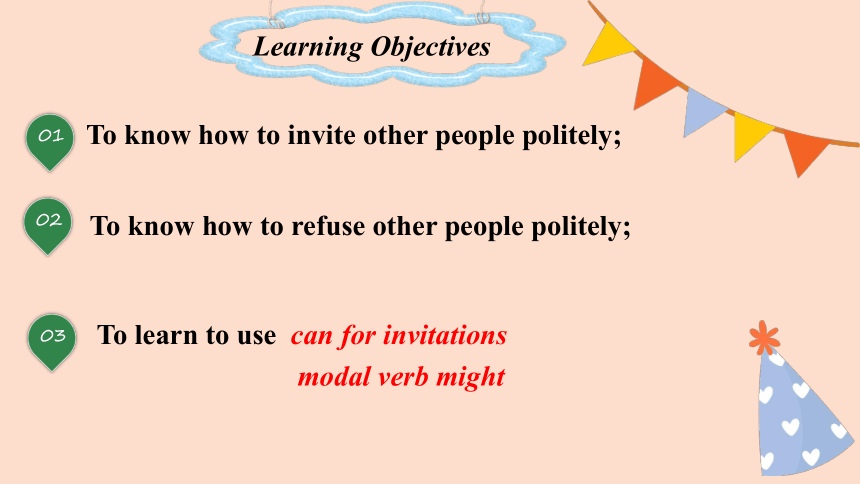
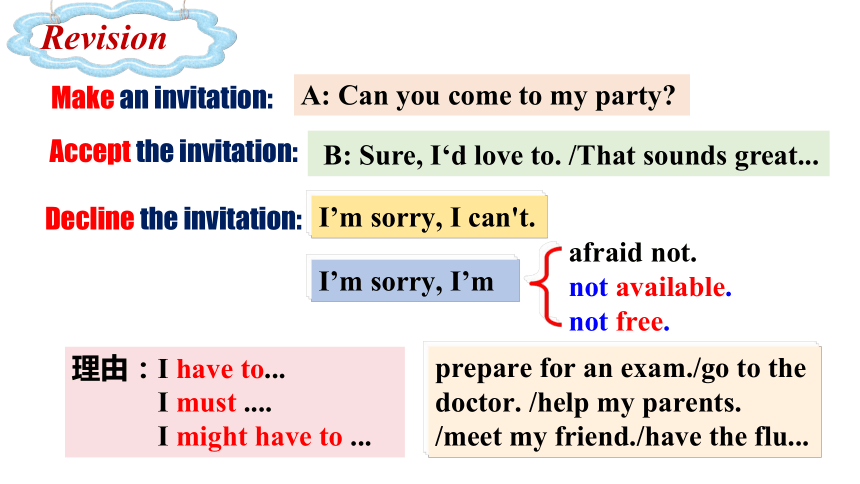
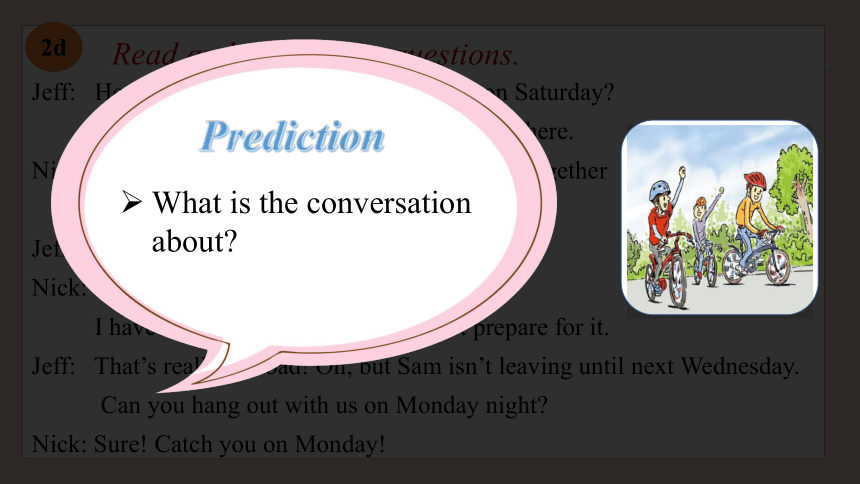
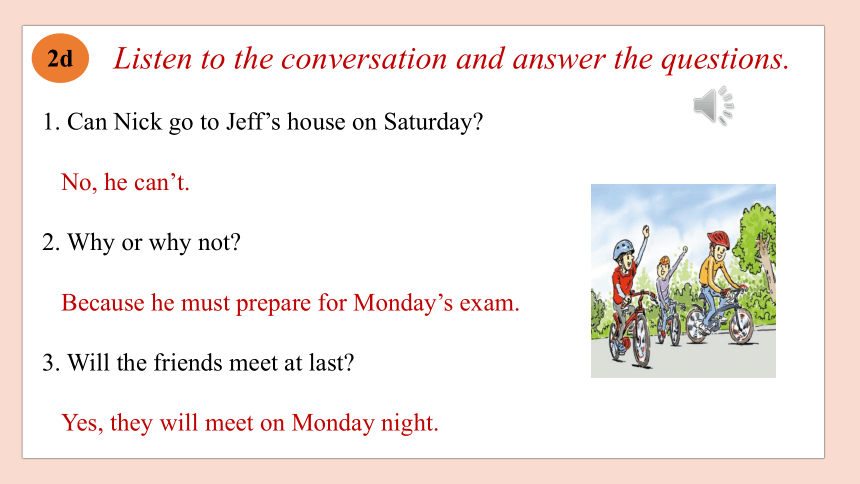
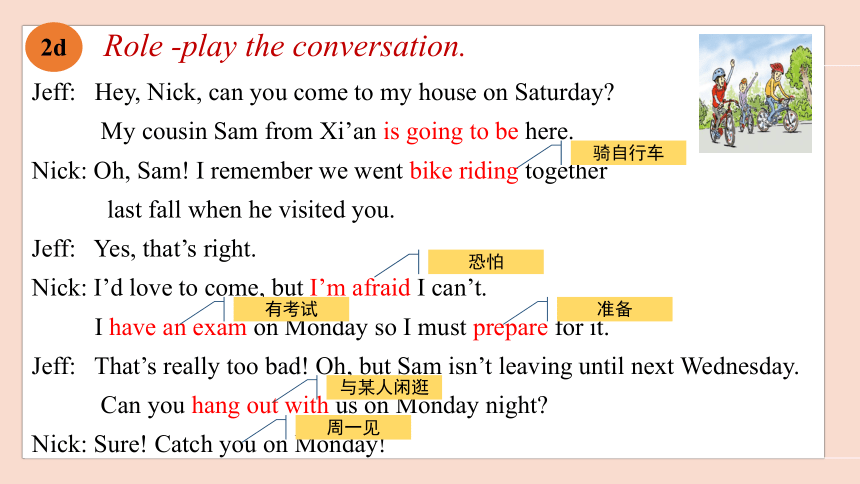
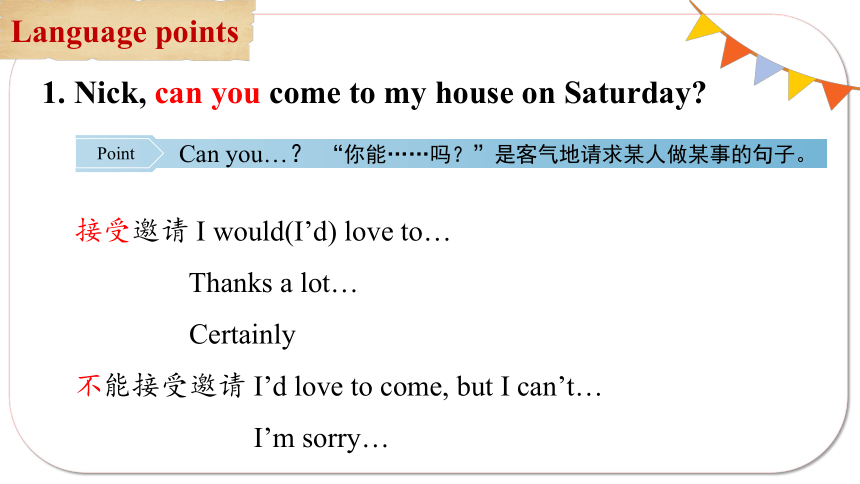
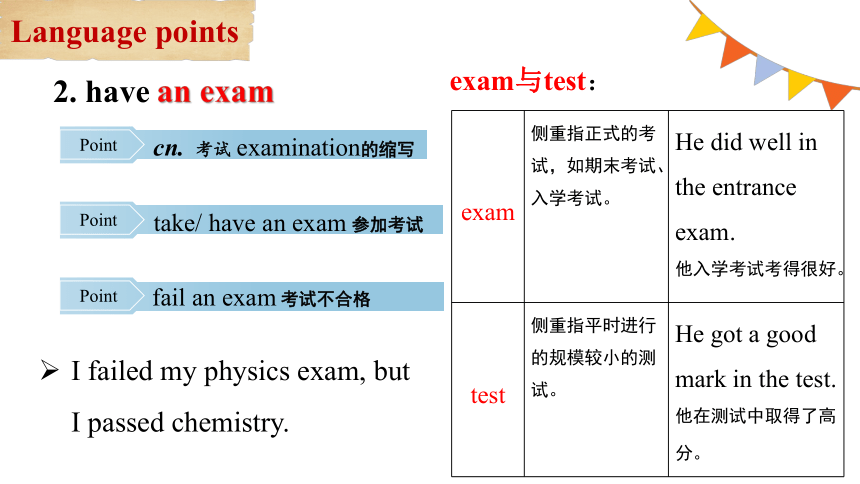
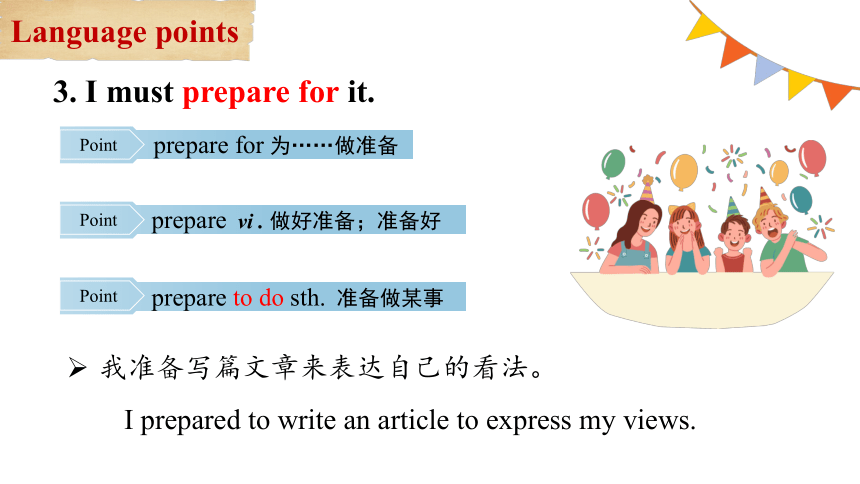
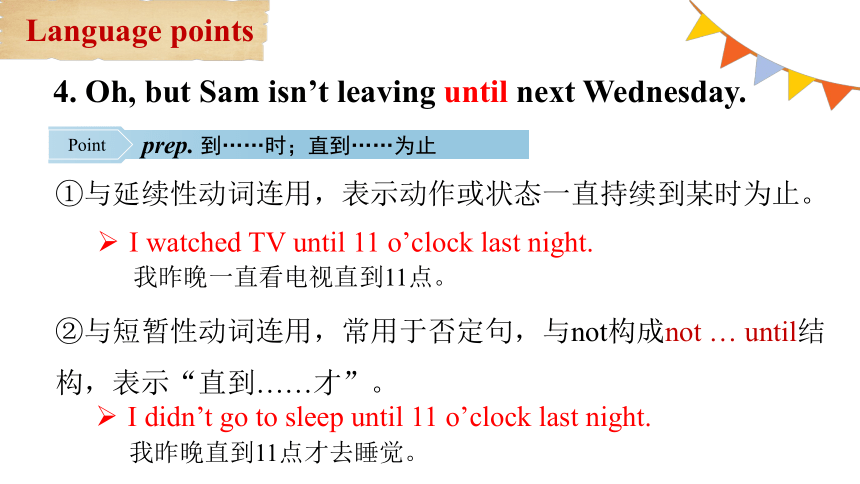
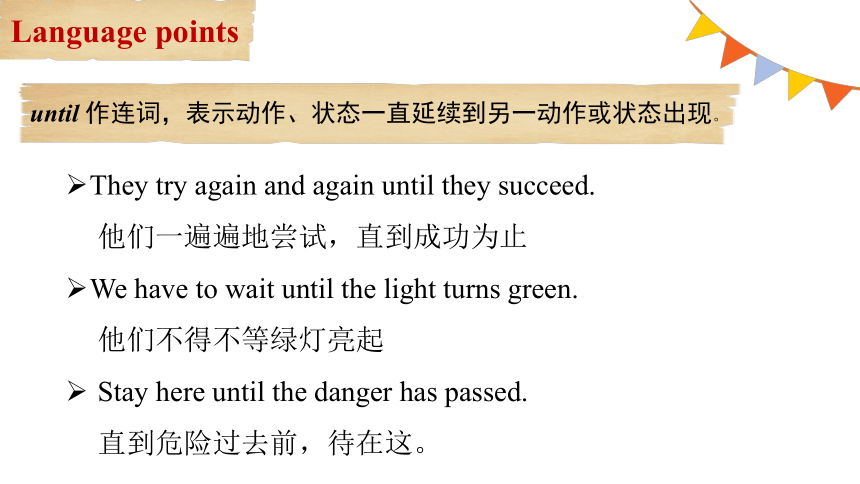
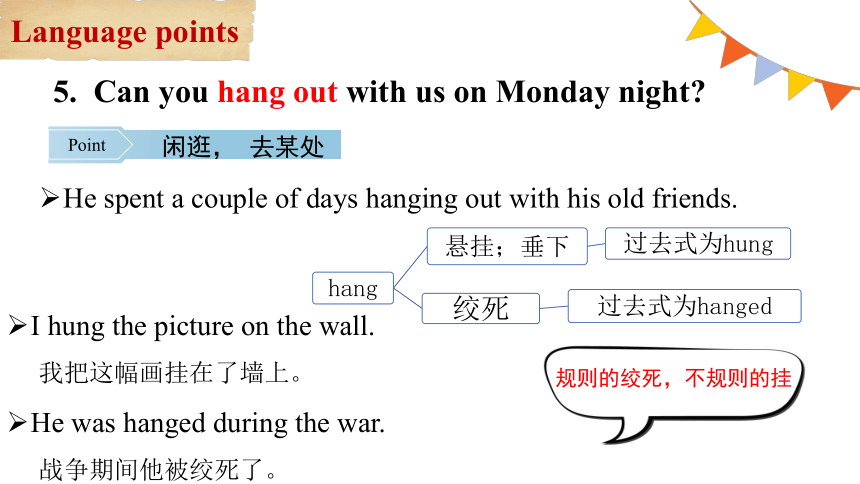
文档简介
(共30张PPT)
Section A (2d&Grammar Focus-3c)
Unit9
Can you come to my party
To learn to use can for invitations
modal verb might
To know how to invite other people politely;
To know how to refuse other people politely;
01
02
03
Learning Objectives
A: Can you come to my party
B: Sure, I‘d love to. /That sounds great...
I’m sorry, I can't.
afraid not.
not available.
not free.
I’m sorry, I’m
理由:I have to...
I must ....
I might have to ...
prepare for an exam./go to the doctor. /help my parents. /meet my friend./have the flu...
Make an invitation:
Accept the invitation:
Decline the invitation:
Revision
Jeff: Hey, Nick, can you come to my house on Saturday
My cousin Sam from Xi’an is going to be here.
Nick: Oh, Sam! I remember we went bike riding together
last fall when he visited you.
Jeff: Yes, that’s right.
Nick: I’d love to come, but I’m afraid I can’t.
I have an exam on Monday so I must prepare for it.
Jeff: That’s really too bad! Oh, but Sam isn’t leaving until next Wednesday.
Can you hang out with us on Monday night
Nick: Sure! Catch you on Monday!
2d
Read and answer the questions.
Prediction
What is the conversation about
1. Can Nick go to Jeff’s house on Saturday
No, he can’t.
2. Why or why not
Because he must prepare for Monday’s exam.
3. Will the friends meet at last
Yes, they will meet on Monday night.
2d
Listen to the conversation and answer the questions.
Jeff: Hey, Nick, can you come to my house on Saturday
My cousin Sam from Xi’an is going to be here.
Nick: Oh, Sam! I remember we went bike riding together
last fall when he visited you.
Jeff: Yes, that’s right.
Nick: I’d love to come, but I’m afraid I can’t.
I have an exam on Monday so I must prepare for it.
Jeff: That’s really too bad! Oh, but Sam isn’t leaving until next Wednesday.
Can you hang out with us on Monday night
Nick: Sure! Catch you on Monday!
2d
Role -play the conversation.
骑自行车
恐怕
有考试
准备
与某人闲逛
周一见
1. Nick, can you come to my house on Saturday
接受邀请 I would(I’d) love to…
Thanks a lot…
Certainly
不能接受邀请 I’d love to come, but I can’t…
I’m sorry…
Can you…? “你能……吗?”是客气地请求某人做某事的句子。
Point
Language points
cn. 考试 examination的缩写
Point
2. have an exam
take/ have an exam 参加考试
Point
fail an exam 考试不合格
Point
exam 侧重指正式的考试,如期末考试、入学考试。 He did well in the entrance exam.
他入学考试考得很好。
test 侧重指平时进行的规模较小的测试。 He got a good mark in the test.
他在测试中取得了高分。
I failed my physics exam, but I passed chemistry.
exam与test:
Language points
prepare for 为……做准备
Point
3. I must prepare for it.
我准备写篇文章来表达自己的看法。
I prepared to write an article to express my views.
prepare vi . 做好准备;准备好
Point
prepare to do sth. 准备做某事
Point
Language points
Language points
prep. 到……时;直到……为止
Point
4. Oh, but Sam isn’t leaving until next Wednesday.
①与延续性动词连用,表示动作或状态一直持续到某时为止。
I watched TV until 11 o’clock last night.
I didn’t go to sleep until 11 o’clock last night.
我昨晚一直看电视直到11点。
我昨晚直到11点才去睡觉。
②与短暂性动词连用,常用于否定句,与not构成not … until结构,表示“直到……才”。
They try again and again until they succeed.
他们一遍遍地尝试,直到成功为止
We have to wait until the light turns green.
他们不得不等绿灯亮起
Stay here until the danger has passed.
直到危险过去前,待在这。
until 作连词,表示动作、状态一直延续到另一动作或状态出现。
Language points
Language points
5. Can you hang out with us on Monday night
闲逛, 去某处
Point
He spent a couple of days hanging out with his old friends.
规则的绞死,不规则的挂
I hung the picture on the wall.
我把这幅画挂在了墙上。
He was hanged during the war.
战争期间他被绞死了。
Language points
6. Catch you on Monday.
v. 及时赶上;接住;抓住
Point
caught 过去式
Be quick, or we’ll fail to catch the school bus.
Can you catch the ball in one hand
v. 感染上
Point
catch a cold 感 冒
catch的相关短语:
catch up with 跟上,赶上 catch one’s eye 引起某人注意
Grammar focus
Can you come to my party on Saturday Sure, I’d love to.
Sorry, I must study for a math test.
Can you go to the movies tomorrow night Sure. That sounds great.
I’m afraid not. I have the flu.
Can he go to the party No, he can’t. He has to help his parents.
Can she go to the baseball game No. she’s not available. She must go to the doctor.
Can they go to the movies No, they’re not free. They might have to meet their friends.
How do we make an invitation
情态动词can除了表示能力、许可和猜测之外,还可以表示邀请。表示邀请时,could比can更礼貌、更委婉。
can表示邀请时常用一般疑问句句式,结构为:
Can+ 主语+ 动词原形+ 其他?
情态动词can表示邀请
Grammar focus
Can you come to my party on Saturday Sure, I’d love to.
Sorry, I must study for a math test.
Can you go to the movies tomorrow night Sure. That sounds great.
I’m afraid not. I have the flu.
Can he go to the party No, he can’t. He has to help his parents.
Can she go to the baseball game No. she’s not available. She must go to the doctor.
Can they go to the movies No, they’re not free. They might have to meet their friends.
How do we accept or refuse an invitation politely
情态动词can表示邀请
对于用情态动词can发出的邀请,回答时主要有两种情况:
接受:①Sure/Yes, I’d love(like) to. 当然,我愿意。
②Sure/Of course. 当然。
……
拒绝:①Sorry, I’m not available. 对不起,我没空。
②I’m sorry. I’m not free. I have to … 抱歉,我没空,我不得不……
③I’d love to, but I’m afraid I can’t. I must …我愿意,但是恐怕不行。我必须…
Grammar focus
Can you come to my party on Saturday Sure, I’d love to.
Sorry, I must study for a math test.
Can you go to the movies tomorrow night Sure. That sounds great.
I’m afraid not. I have the flu.
Can he go to the party No, he can’t. He has to help his parents.
Can she go to the baseball game No. she’s not available. She must go to the doctor.
Can they go to the movies No, they’re not free. They might have to meet their friends.
Besides CAN and MUST , what other modal verb can you find
情态动词might
含义及用法
表示请求,许可,意为“可以”,语气比may更委婉
例句
Might I ask you a question
表示推测,意为“可能”,语气缓和,较委婉,可能性低于may
①He is away from the school. He might be sick.
②The paper says that it might rain
拓展:向别人发出邀请、请求、建议或征求某人的意见,其他表达方法有:
Would you like to… “你想要/愿意……”?
Would/Will/Could you please… “请你……好吗?”
Shall we… “我们……好吗?”
Let’s… “我们……吧。”
Why not… =Why don’t you… “为什么不……?”
How/What about… “……怎么样?”
Complete the answers with might and one of the phrases in the box.
watch TV on the weekend my cousin
visit my grandparents practice the violin
1. A: What are you going to do on Saturday
B: I’m not sure. I might __________________________
2. A: What are you planning to do after school
B: I don’t know. ____________________
3a
visit my grandparents.
I might watch TV.
be going to do 和be planning to do都表示将要做的事情或打算做的事情, 但be panning to do有更强的目的和计划性。
3. A: When will you finish the science homework
B: _____________________________________________
4. A: Who are you going to the movies with
B:______________________________________________
5. A: Are you free to come to my place on Saturday
B: ______________________________________________
I don’t know. I might finish it on the weekend.
I’m not sure. I might be going with my cousin.
I’m not sure. I might have to practice the violin.
watch TV on the weekend my cousin
visit my grandparents practice the violin
Complete the sentences below. Use the words in brackets to help you.
3b
Inviting: ________________________________
can / play tennis
Accepting: ______________________________________ 2. Inviting: ______________________________________
would like to/ go to the movies
Refusing: _________________________________
Reason: _________________________________
might have to
Can you play tennis on Saturday
Sure. That sounds great.
Would you like to go to the movies on Friday
Sorry, I’m not available.
I might have to go out with my parents.
3. Inviting: _______________________________
can/hang out with us tonight
Refusing: ___________________________________
Reason: ___________________________________ must
4. Inviting: _________________________________
would like to / come to my birthday party
Accepting: ______________________________
Can you hang out with us tonight
Sorry, I’m not free.
I must study for a test.
Would you like to come to my birthday party
Sure. I’d love to.
Complete the sentences below. Use the words in brackets to help you.
3b
Write down everything you have to do next week. Choose a day and time to have a party. Then invite classmates to your party.
3c
MON.
TUE.
WED.
THUR.
FRI.
SAT.
SUN.
go to the movies at night
visit my grandpa in the afternoon
look after my sister in the evening
prepare for the chess game at night
study for a test all day
Can you come to my party
When
Next week, on Thursday night.
I’m sorry. I have to study for a math test.
v. 邀请
Point
1. Inviting
My best friend invited me to her birthday party.
Language points
invite
invite sb. to + a party/wedding … 邀请某人参加聚会/婚礼……
invite sb. to do sth. 邀请某人做某事
invitation n.
Point
I am happy to accept your invitation
v. 接受
Point
2. Accept
Language points
accept
接受, 表示主观上意愿接受
收到,表示客观上收到,但不一定会接受。
receive
accept 与 receive:
反义词 refuse
Point
Jenny refused my help politely.
I received a gift, but I didn’t accept it.
1. — ______ you come to my house to watch the baseball match on TV
—Sure, I’d love to.
A. May B. Must C. Should D. Can
2. — Today is my birthday. Can you come to my party tonight
— ______, but I should finish my homework first.
A. That’s too bad B. Yes, please C. No, I don’t know D. I’d love to
3. —Why didn’t you come to my party
—I _____stay at home, because my mother was ill.
A. has to B. have to C. had D. had to
单项选择。
Exercises
4. They were afraid that it _____ rain the next day.
A. must B. should C. might D. may
5. She ______ my invitation because she wasn’t available.
rewarded B. accepted C. refused D. received
6.Harry invited me ______ with him when his parents were out of town.
Stay B. stayed C. staying D. to stay
7. —Could you come back home for dinner
—______. I’ll be at a very important business meeting at that time.
A. I think so. B. I’m afraid not. C. Yes, I hope so. D. I’m afraid so.
Exercises
Homework
1.Recite Grammar Focus.
2.Preview Section B 1a-1f
3.Finish the exercises.
Section A (2d&Grammar Focus-3c)
Unit9
Can you come to my party
To learn to use can for invitations
modal verb might
To know how to invite other people politely;
To know how to refuse other people politely;
01
02
03
Learning Objectives
A: Can you come to my party
B: Sure, I‘d love to. /That sounds great...
I’m sorry, I can't.
afraid not.
not available.
not free.
I’m sorry, I’m
理由:I have to...
I must ....
I might have to ...
prepare for an exam./go to the doctor. /help my parents. /meet my friend./have the flu...
Make an invitation:
Accept the invitation:
Decline the invitation:
Revision
Jeff: Hey, Nick, can you come to my house on Saturday
My cousin Sam from Xi’an is going to be here.
Nick: Oh, Sam! I remember we went bike riding together
last fall when he visited you.
Jeff: Yes, that’s right.
Nick: I’d love to come, but I’m afraid I can’t.
I have an exam on Monday so I must prepare for it.
Jeff: That’s really too bad! Oh, but Sam isn’t leaving until next Wednesday.
Can you hang out with us on Monday night
Nick: Sure! Catch you on Monday!
2d
Read and answer the questions.
Prediction
What is the conversation about
1. Can Nick go to Jeff’s house on Saturday
No, he can’t.
2. Why or why not
Because he must prepare for Monday’s exam.
3. Will the friends meet at last
Yes, they will meet on Monday night.
2d
Listen to the conversation and answer the questions.
Jeff: Hey, Nick, can you come to my house on Saturday
My cousin Sam from Xi’an is going to be here.
Nick: Oh, Sam! I remember we went bike riding together
last fall when he visited you.
Jeff: Yes, that’s right.
Nick: I’d love to come, but I’m afraid I can’t.
I have an exam on Monday so I must prepare for it.
Jeff: That’s really too bad! Oh, but Sam isn’t leaving until next Wednesday.
Can you hang out with us on Monday night
Nick: Sure! Catch you on Monday!
2d
Role -play the conversation.
骑自行车
恐怕
有考试
准备
与某人闲逛
周一见
1. Nick, can you come to my house on Saturday
接受邀请 I would(I’d) love to…
Thanks a lot…
Certainly
不能接受邀请 I’d love to come, but I can’t…
I’m sorry…
Can you…? “你能……吗?”是客气地请求某人做某事的句子。
Point
Language points
cn. 考试 examination的缩写
Point
2. have an exam
take/ have an exam 参加考试
Point
fail an exam 考试不合格
Point
exam 侧重指正式的考试,如期末考试、入学考试。 He did well in the entrance exam.
他入学考试考得很好。
test 侧重指平时进行的规模较小的测试。 He got a good mark in the test.
他在测试中取得了高分。
I failed my physics exam, but I passed chemistry.
exam与test:
Language points
prepare for 为……做准备
Point
3. I must prepare for it.
我准备写篇文章来表达自己的看法。
I prepared to write an article to express my views.
prepare vi . 做好准备;准备好
Point
prepare to do sth. 准备做某事
Point
Language points
Language points
prep. 到……时;直到……为止
Point
4. Oh, but Sam isn’t leaving until next Wednesday.
①与延续性动词连用,表示动作或状态一直持续到某时为止。
I watched TV until 11 o’clock last night.
I didn’t go to sleep until 11 o’clock last night.
我昨晚一直看电视直到11点。
我昨晚直到11点才去睡觉。
②与短暂性动词连用,常用于否定句,与not构成not … until结构,表示“直到……才”。
They try again and again until they succeed.
他们一遍遍地尝试,直到成功为止
We have to wait until the light turns green.
他们不得不等绿灯亮起
Stay here until the danger has passed.
直到危险过去前,待在这。
until 作连词,表示动作、状态一直延续到另一动作或状态出现。
Language points
Language points
5. Can you hang out with us on Monday night
闲逛, 去某处
Point
He spent a couple of days hanging out with his old friends.
规则的绞死,不规则的挂
I hung the picture on the wall.
我把这幅画挂在了墙上。
He was hanged during the war.
战争期间他被绞死了。
Language points
6. Catch you on Monday.
v. 及时赶上;接住;抓住
Point
caught 过去式
Be quick, or we’ll fail to catch the school bus.
Can you catch the ball in one hand
v. 感染上
Point
catch a cold 感 冒
catch的相关短语:
catch up with 跟上,赶上 catch one’s eye 引起某人注意
Grammar focus
Can you come to my party on Saturday Sure, I’d love to.
Sorry, I must study for a math test.
Can you go to the movies tomorrow night Sure. That sounds great.
I’m afraid not. I have the flu.
Can he go to the party No, he can’t. He has to help his parents.
Can she go to the baseball game No. she’s not available. She must go to the doctor.
Can they go to the movies No, they’re not free. They might have to meet their friends.
How do we make an invitation
情态动词can除了表示能力、许可和猜测之外,还可以表示邀请。表示邀请时,could比can更礼貌、更委婉。
can表示邀请时常用一般疑问句句式,结构为:
Can+ 主语+ 动词原形+ 其他?
情态动词can表示邀请
Grammar focus
Can you come to my party on Saturday Sure, I’d love to.
Sorry, I must study for a math test.
Can you go to the movies tomorrow night Sure. That sounds great.
I’m afraid not. I have the flu.
Can he go to the party No, he can’t. He has to help his parents.
Can she go to the baseball game No. she’s not available. She must go to the doctor.
Can they go to the movies No, they’re not free. They might have to meet their friends.
How do we accept or refuse an invitation politely
情态动词can表示邀请
对于用情态动词can发出的邀请,回答时主要有两种情况:
接受:①Sure/Yes, I’d love(like) to. 当然,我愿意。
②Sure/Of course. 当然。
……
拒绝:①Sorry, I’m not available. 对不起,我没空。
②I’m sorry. I’m not free. I have to … 抱歉,我没空,我不得不……
③I’d love to, but I’m afraid I can’t. I must …我愿意,但是恐怕不行。我必须…
Grammar focus
Can you come to my party on Saturday Sure, I’d love to.
Sorry, I must study for a math test.
Can you go to the movies tomorrow night Sure. That sounds great.
I’m afraid not. I have the flu.
Can he go to the party No, he can’t. He has to help his parents.
Can she go to the baseball game No. she’s not available. She must go to the doctor.
Can they go to the movies No, they’re not free. They might have to meet their friends.
Besides CAN and MUST , what other modal verb can you find
情态动词might
含义及用法
表示请求,许可,意为“可以”,语气比may更委婉
例句
Might I ask you a question
表示推测,意为“可能”,语气缓和,较委婉,可能性低于may
①He is away from the school. He might be sick.
②The paper says that it might rain
拓展:向别人发出邀请、请求、建议或征求某人的意见,其他表达方法有:
Would you like to… “你想要/愿意……”?
Would/Will/Could you please… “请你……好吗?”
Shall we… “我们……好吗?”
Let’s… “我们……吧。”
Why not… =Why don’t you… “为什么不……?”
How/What about… “……怎么样?”
Complete the answers with might and one of the phrases in the box.
watch TV on the weekend my cousin
visit my grandparents practice the violin
1. A: What are you going to do on Saturday
B: I’m not sure. I might __________________________
2. A: What are you planning to do after school
B: I don’t know. ____________________
3a
visit my grandparents.
I might watch TV.
be going to do 和be planning to do都表示将要做的事情或打算做的事情, 但be panning to do有更强的目的和计划性。
3. A: When will you finish the science homework
B: _____________________________________________
4. A: Who are you going to the movies with
B:______________________________________________
5. A: Are you free to come to my place on Saturday
B: ______________________________________________
I don’t know. I might finish it on the weekend.
I’m not sure. I might be going with my cousin.
I’m not sure. I might have to practice the violin.
watch TV on the weekend my cousin
visit my grandparents practice the violin
Complete the sentences below. Use the words in brackets to help you.
3b
Inviting: ________________________________
can / play tennis
Accepting: ______________________________________ 2. Inviting: ______________________________________
would like to/ go to the movies
Refusing: _________________________________
Reason: _________________________________
might have to
Can you play tennis on Saturday
Sure. That sounds great.
Would you like to go to the movies on Friday
Sorry, I’m not available.
I might have to go out with my parents.
3. Inviting: _______________________________
can/hang out with us tonight
Refusing: ___________________________________
Reason: ___________________________________ must
4. Inviting: _________________________________
would like to / come to my birthday party
Accepting: ______________________________
Can you hang out with us tonight
Sorry, I’m not free.
I must study for a test.
Would you like to come to my birthday party
Sure. I’d love to.
Complete the sentences below. Use the words in brackets to help you.
3b
Write down everything you have to do next week. Choose a day and time to have a party. Then invite classmates to your party.
3c
MON.
TUE.
WED.
THUR.
FRI.
SAT.
SUN.
go to the movies at night
visit my grandpa in the afternoon
look after my sister in the evening
prepare for the chess game at night
study for a test all day
Can you come to my party
When
Next week, on Thursday night.
I’m sorry. I have to study for a math test.
v. 邀请
Point
1. Inviting
My best friend invited me to her birthday party.
Language points
invite
invite sb. to + a party/wedding … 邀请某人参加聚会/婚礼……
invite sb. to do sth. 邀请某人做某事
invitation n.
Point
I am happy to accept your invitation
v. 接受
Point
2. Accept
Language points
accept
接受, 表示主观上意愿接受
收到,表示客观上收到,但不一定会接受。
receive
accept 与 receive:
反义词 refuse
Point
Jenny refused my help politely.
I received a gift, but I didn’t accept it.
1. — ______ you come to my house to watch the baseball match on TV
—Sure, I’d love to.
A. May B. Must C. Should D. Can
2. — Today is my birthday. Can you come to my party tonight
— ______, but I should finish my homework first.
A. That’s too bad B. Yes, please C. No, I don’t know D. I’d love to
3. —Why didn’t you come to my party
—I _____stay at home, because my mother was ill.
A. has to B. have to C. had D. had to
单项选择。
Exercises
4. They were afraid that it _____ rain the next day.
A. must B. should C. might D. may
5. She ______ my invitation because she wasn’t available.
rewarded B. accepted C. refused D. received
6.Harry invited me ______ with him when his parents were out of town.
Stay B. stayed C. staying D. to stay
7. —Could you come back home for dinner
—______. I’ll be at a very important business meeting at that time.
A. I think so. B. I’m afraid not. C. Yes, I hope so. D. I’m afraid so.
Exercises
Homework
1.Recite Grammar Focus.
2.Preview Section B 1a-1f
3.Finish the exercises.
同课章节目录
- Unit 1 Where did you go on vacation?
- Section A
- Section B
- Unit 2 How often do you exercise?
- Section A
- Section B
- Unit 3 I'm more outgoing than my sister.
- Section A
- Section B
- Unit 4 What's the best movie theater?
- Section A
- Section B
- Unit 5 Do you want to watch a game show?
- Section A
- Section B
- Unit 6 I'm going to study computer science.
- Section A
- Section B
- Unit 7 Will people have robots?
- Section A
- Section B
- Unit 8 How do you make a banana milk shake?
- Section A
- Section B
- Unit 9 Can you come to my party?
- Section A
- Section B
- Unit 10 If you go to the party, you'll have a grea
- Section A
- Section B
